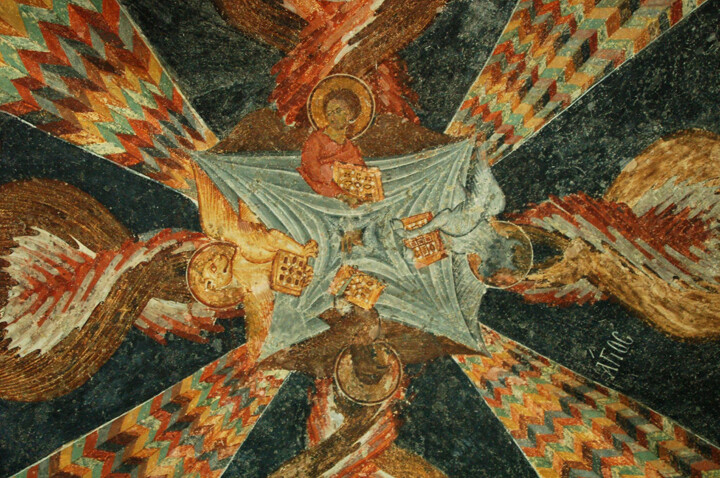Ask the Theologian: God and the Devil

Dear Theologian,
If God is the Creator of all that is, where did the Devil come from? Was the Devil created by God? But that would make God the author of evil! Putting the question another way: Isn’t everything that is created by God “very good” (Gen 1:31)? Then where does evil come from? How is evil even possible?
~Puzzling Over Good and Evil
Dear Puzzling,
Christian tradition considers the Devil to be a “fallen Angel,” that is, a spiritual being that was created by God but refused to subject his will to God’s will. As created, the Angel was “good,” just as all things created by God are good. But this Angel used his freedom to reject God and to choose alienation and misery. He thus became “evil” himself, and a principle of evil that seeks to draw others into sin.
It’s important to note here that authentic Christian faith does not consider the Devil to be an equal of God. It’s not as if there were two equal principles—one good and one evil—endlessly battling each other. This kind of dualism is really alien to the Christian understanding that God is the Creator of all things.
But we’re still left with the puzzle that you have named. If what God creates is good, how can it “go bad?” Where does evil come from? In fact, as you put it, how is evil even possible?
Before tackling this, let’s make a distinction between “physical evil” and “moral evil.” Earthquakes, floods and diseases are examples of physical evil (for the human beings affected by them). Many thinkers have struggled to reconcile such events with the belief that God’s created world is “very good.” From our limited point of view, it often doesn’t seem that way.
I want to limit this discussion to “moral evil”—that is, the malicious choice by a free, rational creature to do what is harmful to self and others. History is replete with examples of this, both great and small. We might think spontaneously of the Nazis’ cold-blooded carrying-out of genocide against the Jews. But there are other examples from more recent years in places such as Cambodia, Bosnia, Kosovo, and Rwanda. Moral evil on such a scale staggers and sickens the human heart.
There are also the smaller, less public instances of moral evil that occur constantly on all sides—causing great harm and suffering. We hear about them every day in the news media. And then there is the moral evil in ourselves that, if we are honest, we must discover and repent of.
So, although we believe in God as the totally good Creator of all that is, we have to recognize that the world God creates is actually shot through with moral evil. How can we account for this state of affairs? Why would God create a world where such things are possible?
At this point, we come up against the sheer paradox of “created freedom.” In creating, God really “lets” things exist on their own, apart from God. And some of the beings that God “lets be” have the freedom to choose either good or evil.
But why would God create a world in which some of God’s creatures can and do choose moral evil? The answer has to be sought in some understanding of why freedom is apparently so important to God. What God ultimately intends, we believe, is the free response of God’s creatures to the Love which creates and redeems them. And it is only beings who can choose either good or evil who can freely choose the good.
So, we might say that God takes a great risk in creating—the risk that the creatures will choose evil and “nothingness” rather than the fullness of being that God intends for them.
But this is not the whole story. The Love which “lets” the creatures exist as free beings, capable of choosing evil, does more than create. As Christian faith affirms, this Love also enters personally into the created order to redeem and save the creatures who would otherwise be “lost.”
In Christ’s incarnation, death and resurrection, evil is overcome by good. And those who participate now in his suffering look forward to a future in which they will participate in his glory. In the meantime, they are called to embody his saving love, which alone can counter the moral evil in the world.
To return to your original question, we might say this: God did not create “a Devil.” God created a spiritual being (an “Angel”) whose very existence sprang from the unqualified goodness of God. The Angel who chose evil became “the Devil” by his own free choice.
Following the same line of thought, God does not create “morally evil beings.” God creates beings that are fundamentally good insofar as they spring from God’s utter goodness. But the creatures endowed with freedom can and do sometimes choose moral evil. Even so, they do not become totally evil.
Furthermore, Christian faith recognizes in Christ the permanent, unswerving intention of God to forgive and reconcile all who will renounce evil and choose good once again. No one, in this view, is absolutely “lost” except by stubbornly choosing to remain in that condition. The Christian theologian Origen (third century) speculated that even the Devil would ultimately “turn back” to God and be reconciled with the Love that holds him in being.
Moral evil is an anomaly in the God-created world, to be sure. In principle, it “should not be.” But in actuality, it appears to have been part of the human scene from the very beginnings of human life. Nevertheless, the faithful and merciful Love that is at the heart of things has also been present from the beginning. That Love has become flesh in Christ, and has been victorious over sin and death.
It is for us to bear witness to Him in the way we encounter the moral evil in the world. We are to do our best to live by St. Paul’s words to the believers in Rome: “Do not be overcome by evil, but overcome evil with good.” (Rom 12:21).
Faithfully,
The Theologian

The Rev. Dr. Wayne L. Fehr wrote a column for a previous version of the diocesan newsletter called Ask a Theologian. He answered questions from ordinary Christians trying to make sense of their faith. Now he's back with a monthly column once again. You can find and purchase his book on Tracing the Contours of Faith: Christian Theology for Questioners here.


